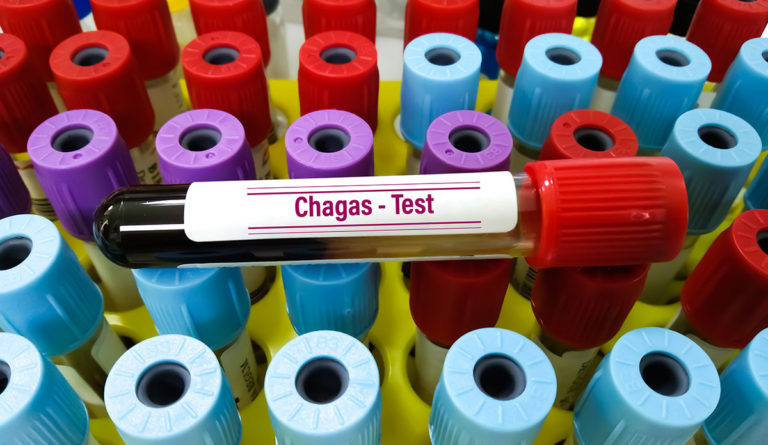And Just Like That… Gone!
Implementing widespread Chagas screening in primary care settings can reduce morbidity, mortality, and healthcare costs for Latinx immigrants.

Read Time: 4 minutes
Published:
A young patient who seems perfectly healthy suffers a massive stroke, caused by a disease that is foreign to most physicians in the United States: Chagas disease. The stroke could have been prevented if the patient had not faced so many barriers to timely diagnosis and treatment. As a Latinx immigrant, this patient’s case is not unique.
Many Latinx immigrants face a similar struggle when accessing care, whether that is due to a lack of insurance or transportation, language barriers, or work schedules that make attending appointments difficult. Without effective screening and treatment for Chagas disease, we are forced to reckon with the possibility of severe health outcomes such as strokes, heart attacks, and death. To provide equitable and comprehensive care to their patients, providers caring for Latinx immigrants should recognize the impact of Chagas on their community. We believe the best way to achieve this is by increasing Chagas awareness among health care providers and encouraging them to facilitate screening.
Chagas disease is a neglected tropical disease endemic to Central and South America and Mexico, caused by the parasite Trypanosoma cruzi (T. cruzi). T. cruzi is transmitted by triatomine bugs when their parasite-ridden feces enter the body of a human host. The parasite can also be transmitted vertically from mother to child, through organ donation, and via blood transfusions.
Infected individuals are often asymptomatic during the acute phase of Chagas disease, but those who experience symptoms report fever, swelling at the site of infection, fatigue, body aches, and vomiting. If left untreated, most infected persons will progress into the chronic phase of Chagas, which is associated with severe health outcomes such as cardiac arrhythmias, cardiomyopathy, megaesophagus, megacolon, heart failure, and cardiac arrest. Screening can help identify patients early and engage them in care while treatment is still effective, thereby preventing these consequences.
There are an estimated 8-10 million Chagas cases worldwide, most of which remain undiagnosed. In the U.S. alone, overall cases exceed 300,000.
There are an estimated 8-10 million Chagas cases worldwide, most of which remain undiagnosed. In the U.S. alone, overall cases exceed 300,000. This disease is particularly important in the U.S. because Latinx immigrants comprise 44% of the United States’ 44.7 million immigrants. Current estimates of Chagas prevalence and incidence are limited due to a lack of adequate screening and diagnosis. To appropriately diagnose and treat Chagas patients, screening programs must be implemented in all communities with at-risk populations.
The Implementing Novel Strategies for Education and Chagas Testing (INSECT) project at Boston Medical Center and Boston University aims to enhance Chagas awareness in providers and patients alike, with the ultimate goal of increasing screening and treatment rates in Latinx patients in a primary care setting. The INSECT team has conducted a series of in-depth interviews and group interviews to address the barriers to screening, improve Chagas awareness among providers, and encourage the implementation of screening programs nationally.
The Strong Hearts program at East Boston Neighborhood Health Center offers a primary care model for Chagas screening, which serves as the blueprint for INSECT. Through Strong Hearts, Latinx immigrants are routinely screened for Chagas. Those with a confirmed diagnosis are promptly referred to infectious disease specialists at Boston Medical Center for continued care and treatment.
Primary care providers often serve as the first, and potentially only point of contact at-risk populations have with the health care system. By strengthening Chagas education and implementing widespread screening in this setting, we can lessen this threat among Latinx immigrants, reducing morbidity, mortality, and healthcare costs.
When establishing a Chagas screening program, clinics and hospital systems may face challenges such as time constraints, testing costs, and specimen storage. To overcome these issues and others, our team is dedicated to helping providers work through any roadblocks to provide the care needed to serve our immigrant populations. For those who would like access to our resources for setting up a Chagas screening program, they have been made available on our website.
With the expansion of Chagas screening and treatment, we can provide a more equitable healthcare experience for Latinx immigrant patients. We also anticipate that this will drive healthcare expenditures down by saving costs on emergency care, advanced cardiac support, and chronic disease follow-up. Screening our vulnerable immigrant and migrant populations for Chagas is important because we know cases are out there. If we screen for it, we will find it.
Photo via Getty Images




